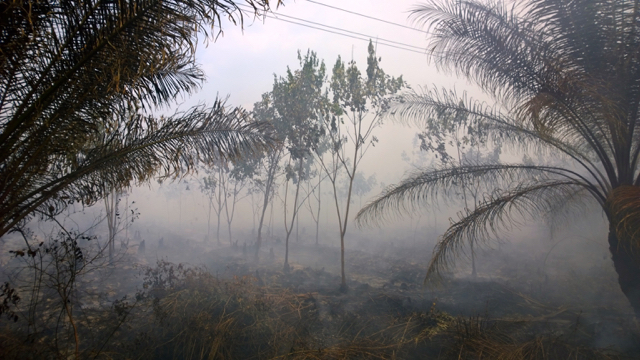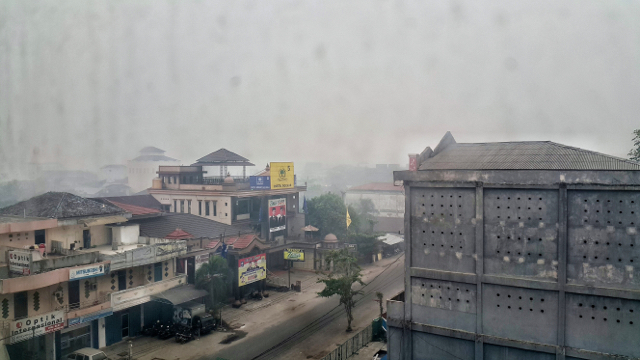- As fires burning across Indonesia blanket the region in a noxious haze, President Joko Widodo traveled to Kalimantan to observe disaster mitigation efforts there.
- The air quality has been contaminated in Central Kalimantan more than anywhere else in the country, yet residents feel the central government has paid more attention to the fires in Sumatra because haze from there is blowing into Malaysia and Singapore.
- Activists call for the government to stop permitting oil palm companies to operate on peat, which must be drained and dried out – which makes it like a tinderbox – before it can be planted with certain crops.
Amid cries that Indonesia’s central government is more concerned about stamping out the fires belching haze in Sumatra, which is downwind from Singapore and Malaysia, than in Kalimantan, which has perhaps been harder hit, President Joko “Jokowi” Widodo paid a visit to the latter this week in a bid to galvanize the authorities to get the disaster under control.
He traveled to several cities in South Kalimantan province on Wednesday before proceeding on Thursday to Central Kalimantan, the air in whose capital, Palangkaraya, has been more contamined than anywhere else in the country.
As of Tuesday, Palangkaraya’s air quality index (ISPU) was 1,575, meaning the average square meter of atmosphere contained as many particles with a diameter of 10 micrometers. Anything above 300 is classified as hazardous.
Protests at a perceived lack of attention from Jokowi’s administration to the crisis in Kalimantan have emerged on social media, with hashtags like #KaltengJugaIndonesia (Central Kalimantan is also Indonesia) and #ISPUPalangkaraya2000 trending along with the more widely used #MelawanAsap (Oppose haze).
Mr.P say: "..Bencana Asap di Kalteng sudah parah sekali.." Baru tau toh?? Bukannya #kaltengjugaindonesia ??
— Safrudin Mahendra (@safrudin) September 24, 2015
“Mr. President says: “..The haze crisis in Central Kalimantan has become very severe..” You just figured that out?? Is not #CentralKalimantanAlsoIndonesia??
https://twitter.com/fadhylcuapz/status/646738176657068033
“I swear to God we miss the clean and fresh air”
As during a recent trip to South Sumatra, Jokowi called for the permits of companies that use fire to clear land to be revoked.
“I instruct everyone to take action, from the military and the police to the local governments and the people,” Jokowi said in a statement posted to his official Facebook page. “Together we must work hard to put out the fires and get rid of the haze.”


Under Indonesian law, companies bear responsibility for fires that break out in their concessions, whether they started them or not. According to the Indonesia Forum for the Environment (Walhi), an NGO, 196 companies in Central Kalimantan have fires burning in their concessions.
Arie Rompas, execuive director of Walhi’s branch in the province, called for companies proven to have broken the law to have their permits revoked and their assets seized by the state. Executives should face criminal charges, he added, and the company should have to put up the money needed to restore the environment.
“Unfortunately, only seven companies have been closed up by the Environment and Forestry Ministry and three investigated by the police,” Arie said. “That’s minimal – it won’t have a deterrent effect.”
The central government, he added, has been more focused on the situation in Sumatra than in Kalimantan because of the complaints from Singapore and Malaysia, where haze from Indonesia has affected the air quality.
Arie called for Jokowi to follow up his visit with comprehensive policy reform.
“The government is ignoring the main problem by continuing to give companies permits to operate on peatlands, which intensifies the disaster and makes it happen again and again.”
Peat is a marshy material that stores incredible amounts of carbon. Peatlands in Indonesia have been widely drained in order to them plant with crops like oil palm, but doing so dries them out and makes them extremely susceptible to catching fire.
